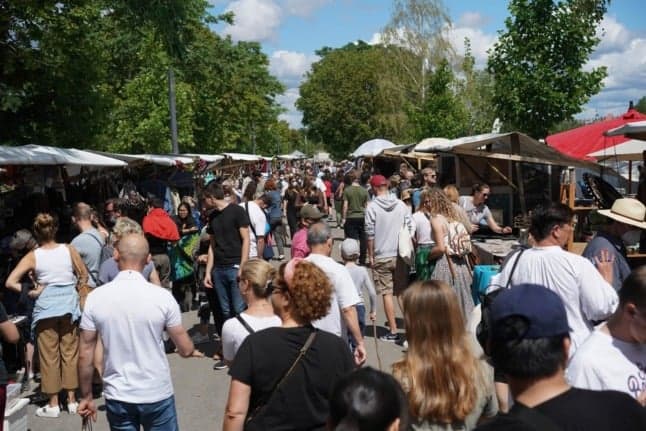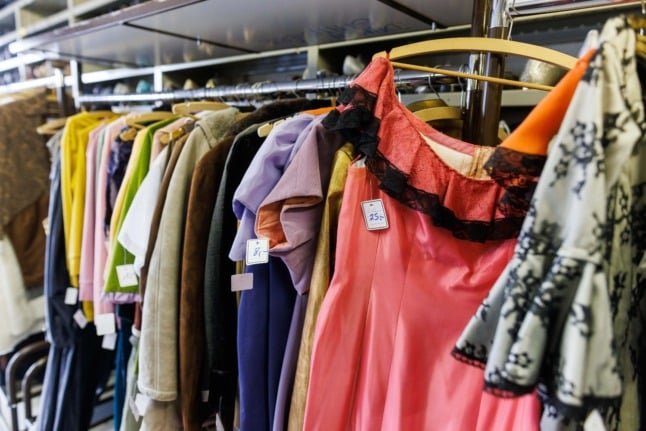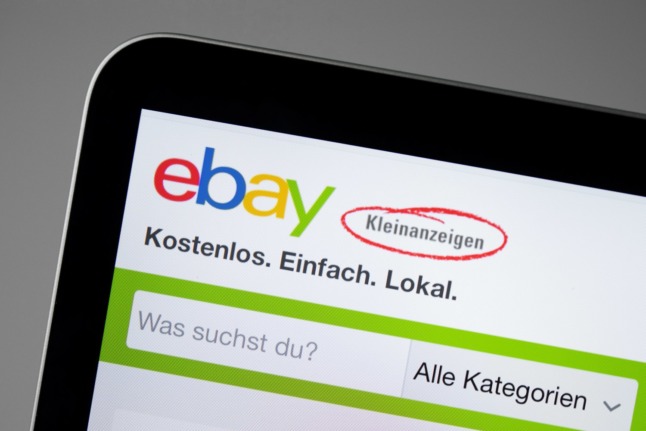How to master second-hand shopping like a German

From strict recycling rules to selling on clothes or other items, Germans love to get the most out of goods. Zazie Atkinson explains how to dig around for second-hand treasure.
If there’s one thing people tend to associate with Germany, besides beer and cars, it is that it has a reputation for being a green country.
People in Germany love to recycle (hence the seemingly dozens of different bins to separate their rubbish into – and the angry reactions if you do it wrong), and the nation is generally considered to be taking the fight against climate change seriously.
As a result, there is a huge second-hand culture in Germany – the turnover of goods sold in second-hand retail outlets increased from €1.9 million in 2012 to almost €2.2 million in 2020.
And what has become increasingly noticeable in recent years, is that the former stigma and shame around buying second-hand clothing has largely been replaced - it's now viewed as being stylish and caring for the environment.
READ ALSO: The complete guide to recycling in Germany
So how do you go about finding second-hand goods in Germany?
There are many in-person stores, ranging from flea markets, charity shops, vintage stores and other second-hand shops. A lot of these are independent stores so you'll also be doing your bit to support local businesses. Keep a look out (or search online) for 'An-und-Verkauf' - by and sell - stores.
In terms of chains, you’ll find Humana, Germany’s biggest second-hand retailer that raises money for social causes, and Re-Sales dotted around the big cities, such as Berlin, Cologne, Leipzig, Hamburg and Nuremberg. Humana’s stores are often pretty big, and you won’t necessarily find high fashion brands, but if you rifle through the many racks of clothes, you’re sure to find good deals and sometimes even vintage pieces.
Pick’n’Weight stores have also been gaining popularity in recent years across the globe, with vintage clothes being sold by the kilo.

Second-hand clothes being sold from the Badisches Staatstheater's trove in November 2021 in Karlsruhe. Photo: picture alliance/dpa | Philipp von Ditfurth
Familiar charity shops such as Oxfam can also be found across Germany, from Hamburg to Stuttgart, Düsseldorf and Dresden, as well as German Red Cross stores, or ‘Rotkreuz-Laden’.
It's also worth digging around for second-hand jewellery shops where you can find some great deals and unique pieces.
And if it's a used bike you're after, look no further than the big second-hand bicycle markets that tend to spring up in German cities throughout the year. In Berlin, you can find a huge collection of bargain bicycles at specialist flea markets in Moabit, Kreuzberg and Prenzlauer Berg, while in Munich, you can find 1,000s of used bikes at an annual flea market in Zenith. Events are often advertised on Facebook and on the state government website, so be sure to keep an eye out for the next one near you!
The second-hand trend has also made its way into department stores; the Berlin Senate for example voted to open a number of second-hand department stores across the city, hoping to rival the popular Galeria Kaufhof or Karstadt.
The “B-Wa(h)renhaus” opened in September 2020, with Berlin’s State Secretary for the Environment and Climate Protection Stefan Tidow claiming he wanted to bring second-hand initiatives out of the niche and into the mainstream for all Berliners. Unfortunately, due to coronavirus restrictions, the store had to shut, however it is hoping to reopen by February 2022, so make sure you keep a lookout.
READ ALSO: Five ways living in Germany makes you greener (without even realising it)
Go online
There are apps specifically created to re-selling and buying second-hand items. Particularly during previous Covid lockdowns, many people turned to online shopping to buy everything from groceries to clothes and more. Luckily, there are now a number of websites and apps to buy and sell used items.
Among the most widely used in Germany are Vinted (formerly known as ‘Kleiderkreisel’) and Zalando Zircle. Anyone with a smartphone can download these apps and buy and resell used clothing and accessories, a lot of the time at just a fraction of the original price.
Another popular app in Germany is Ebay Kleinanzeigen, where you will also find used furniture, cars, books, appliances and even apartments, as well as Facebook Marketplace, which you might be familiar with.

Ebay Kleinanzeigen is popular among Germans for selling and buying used items. Photo: picture alliance/dpa/dpa-tmn | Catherine Waibel
Alternatively, there are also apps and websites made for renting clothes, such as CLOTHESfriends, a Munich-based startup.
Another handy website to check out if you live in Berlin is the A-Gain Guide, which is a digital map that can help you upcycle your own pieces across the city. Users can search for alteration tailors, second-hand stores, designers, collection points, cobblers and other initiatives to give their clothes a new life.
'Zu verschenken'
Something that I’ve also noticed since moving to Berlin is that many people leave their old clothes or books on their doorstep, on the side of the street or in apartment stairwells for neighbours to take. They are usually in a box with the tag 'zu verschenken' - to give away.
While it is of course recommended to wash or clean any items first, it is a great way to avoid old clothes ending up in landfill and adds to the community feel of Berlin. As an anonymous user on a forum querying what to do with unwanted furniture said; “bring it to Berlin and leave it here – someone will take it.”.
Sometimes people also leave furniture on the street. If it's in a good condition, it's another way to decorate your home without spending money, and doing your bit for the planet.
By shopping second-hand, you can shop both sustainably, and cheaply. And it seems in recent years, second-hand shopping has slowly moved into the mainstream, not just for those in need or the more environmentally conscious.
Useful vocabulary
Flea market - (der) Flohmarkt
Charity shop - (der) Wohltätigkeitsladen
To buy second hand/used - gebraucht kaufen or Second-Hand kaufen
An-und Verkaufläden - Buy-and-sell shops (An-und-Verkauf is typically seen on signs on many second hand shops)
Jewellery shops - (die) Schmuckgeschäften
We’re aiming to help our readers improve their German by translating vocabulary from some of our news stories. Did you find this article useful? Let us know.
Comments (1)
See Also
If there’s one thing people tend to associate with Germany, besides beer and cars, it is that it has a reputation for being a green country.
People in Germany love to recycle (hence the seemingly dozens of different bins to separate their rubbish into – and the angry reactions if you do it wrong), and the nation is generally considered to be taking the fight against climate change seriously.
As a result, there is a huge second-hand culture in Germany – the turnover of goods sold in second-hand retail outlets increased from €1.9 million in 2012 to almost €2.2 million in 2020.
And what has become increasingly noticeable in recent years, is that the former stigma and shame around buying second-hand clothing has largely been replaced - it's now viewed as being stylish and caring for the environment.
READ ALSO: The complete guide to recycling in Germany
So how do you go about finding second-hand goods in Germany?
There are many in-person stores, ranging from flea markets, charity shops, vintage stores and other second-hand shops. A lot of these are independent stores so you'll also be doing your bit to support local businesses. Keep a look out (or search online) for 'An-und-Verkauf' - by and sell - stores.
In terms of chains, you’ll find Humana, Germany’s biggest second-hand retailer that raises money for social causes, and Re-Sales dotted around the big cities, such as Berlin, Cologne, Leipzig, Hamburg and Nuremberg. Humana’s stores are often pretty big, and you won’t necessarily find high fashion brands, but if you rifle through the many racks of clothes, you’re sure to find good deals and sometimes even vintage pieces.
Pick’n’Weight stores have also been gaining popularity in recent years across the globe, with vintage clothes being sold by the kilo.

Familiar charity shops such as Oxfam can also be found across Germany, from Hamburg to Stuttgart, Düsseldorf and Dresden, as well as German Red Cross stores, or ‘Rotkreuz-Laden’.
It's also worth digging around for second-hand jewellery shops where you can find some great deals and unique pieces.
And if it's a used bike you're after, look no further than the big second-hand bicycle markets that tend to spring up in German cities throughout the year. In Berlin, you can find a huge collection of bargain bicycles at specialist flea markets in Moabit, Kreuzberg and Prenzlauer Berg, while in Munich, you can find 1,000s of used bikes at an annual flea market in Zenith. Events are often advertised on Facebook and on the state government website, so be sure to keep an eye out for the next one near you!
The second-hand trend has also made its way into department stores; the Berlin Senate for example voted to open a number of second-hand department stores across the city, hoping to rival the popular Galeria Kaufhof or Karstadt.
The “B-Wa(h)renhaus” opened in September 2020, with Berlin’s State Secretary for the Environment and Climate Protection Stefan Tidow claiming he wanted to bring second-hand initiatives out of the niche and into the mainstream for all Berliners. Unfortunately, due to coronavirus restrictions, the store had to shut, however it is hoping to reopen by February 2022, so make sure you keep a lookout.
READ ALSO: Five ways living in Germany makes you greener (without even realising it)
Go online
There are apps specifically created to re-selling and buying second-hand items. Particularly during previous Covid lockdowns, many people turned to online shopping to buy everything from groceries to clothes and more. Luckily, there are now a number of websites and apps to buy and sell used items.
Among the most widely used in Germany are Vinted (formerly known as ‘Kleiderkreisel’) and Zalando Zircle. Anyone with a smartphone can download these apps and buy and resell used clothing and accessories, a lot of the time at just a fraction of the original price.
Another popular app in Germany is Ebay Kleinanzeigen, where you will also find used furniture, cars, books, appliances and even apartments, as well as Facebook Marketplace, which you might be familiar with.

Alternatively, there are also apps and websites made for renting clothes, such as CLOTHESfriends, a Munich-based startup.
Another handy website to check out if you live in Berlin is the A-Gain Guide, which is a digital map that can help you upcycle your own pieces across the city. Users can search for alteration tailors, second-hand stores, designers, collection points, cobblers and other initiatives to give their clothes a new life.
'Zu verschenken'
Something that I’ve also noticed since moving to Berlin is that many people leave their old clothes or books on their doorstep, on the side of the street or in apartment stairwells for neighbours to take. They are usually in a box with the tag 'zu verschenken' - to give away.
While it is of course recommended to wash or clean any items first, it is a great way to avoid old clothes ending up in landfill and adds to the community feel of Berlin. As an anonymous user on a forum querying what to do with unwanted furniture said; “bring it to Berlin and leave it here – someone will take it.”.
Sometimes people also leave furniture on the street. If it's in a good condition, it's another way to decorate your home without spending money, and doing your bit for the planet.
By shopping second-hand, you can shop both sustainably, and cheaply. And it seems in recent years, second-hand shopping has slowly moved into the mainstream, not just for those in need or the more environmentally conscious.
Useful vocabulary
Flea market - (der) Flohmarkt
Charity shop - (der) Wohltätigkeitsladen
To buy second hand/used - gebraucht kaufen or Second-Hand kaufen
An-und Verkaufläden - Buy-and-sell shops (An-und-Verkauf is typically seen on signs on many second hand shops)
Jewellery shops - (die) Schmuckgeschäften
We’re aiming to help our readers improve their German by translating vocabulary from some of our news stories. Did you find this article useful? Let us know.
Join the conversation in our comments section below. Share your own views and experience and if you have a question or suggestion for our journalists then email us at [email protected].
Please keep comments civil, constructive and on topic – and make sure to read our terms of use before getting involved.
Please log in here to leave a comment.